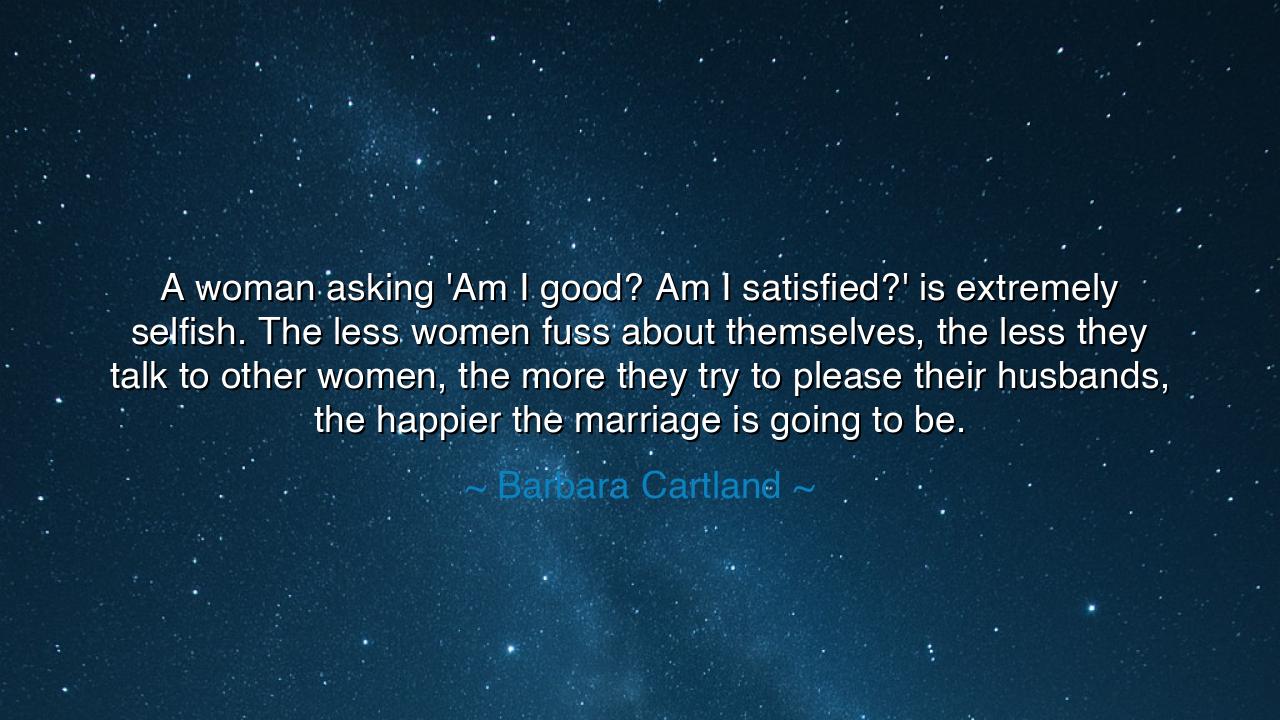
A woman asking 'Am I good? Am I satisfied?' is extremely selfish.
A woman asking 'Am I good? Am I satisfied?' is extremely selfish. The less women fuss about themselves, the less they talk to other women, the more they try to please their husbands, the happier the marriage is going to be.






"A woman asking 'Am I good? Am I satisfied?' is extremely selfish. The less women fuss about themselves, the less they talk to other women, the more they try to please their husbands, the happier the marriage is going to be." These words by Barbara Cartland ring with a particular perspective on marriage, selflessness, and gender roles—concepts that have been debated across centuries. Cartland’s statement speaks to a view that often surfaces in the ancient and traditional understandings of marriage, where the roles of wife and husband are seen as duties to be fulfilled with dedication to the other, rather than oneself. The idealized version of marriage that she presents focuses on the idea of sacrifice and the importance of pleasing the other in order to secure happiness and harmony in the union.
This philosophy finds its roots in many ancient cultures, where the woman’s role was often understood as being secondary to that of her husband’s. In Ancient Greece, for example, women were largely confined to the domestic sphere. They were expected to support their husbands, manage the household, and bear children. The concept of a wife’s personal happiness was secondary to her ability to maintain her duties as a caregiver and companion. The happiness of the marriage, it was believed, could be maintained when the wife focused on the needs and desires of the husband rather than her own. The focus on selflessness, much like Cartland suggests, was seen as a virtue, and the woman’s fulfillment was considered a byproduct of fulfilling her role.
One such example from history is the relationship between Queen Victoria and Prince Albert of England. Queen Victoria was deeply devoted to her husband, and her selfless commitment to his needs and happiness was a cornerstone of their relationship. Her reign was marked by a partnership with Prince Albert, where both roles—husband and wife—were fulfilled in a way that adhered to the social expectations of the time. Victoria, often seen as the epitome of duty and dedication, did not question her role as a wife, and through this dedication, she achieved a form of personal fulfillment that resonated in her public and private life. The happiness of her marriage was rooted in this sacrifice and selflessness, which Cartland advocates in her view of the ideal marriage.
Yet, as time has passed, the role of women has evolved, and with it, the concept of marriage. In more modern times, the question of self-fulfillment has become central to the dialogue about marriage and relationships. Women, in particular, have begun to demand more than just the role of caregiver and supporter. The notion that a woman should prioritize pleasing her husband at the expense of her own well-being or identity has come under scrutiny. Marriage, it is now understood, is about mutual fulfillment, where both partners—husband and wife—nurture their own personal growth and happiness while fostering a shared bond. The wisdom of balance becomes more evident: it is not selfish for a woman to ask if she is satisfied, for in doing so, she acknowledges that her own well-being contributes to the health of the relationship.
Even in ancient Rome, where marriage was also seen as a social contract, the importance of personal satisfaction within the union was not completely overlooked. Roman marriages, though arranged and heavily rooted in duty, also had spaces for personal affection and companionship. Cicero, the famous orator and philosopher, wrote about the importance of a mutual bond of respect between husband and wife, and his writings suggested that for a marriage to truly flourish, both partners must be able to find harmony and respect in their roles. Thus, Cartland’s view, while certainly rooted in historical traditions, must be balanced with the understanding that happiness in marriage does not lie solely in one partner’s sacrifice or selflessness, but in the shared responsibility and support of both.
The lesson in Cartland's statement lies in understanding the complexities of marriage. Marriage is not merely the act of pleasing one’s spouse or fulfilling a role, but a partnership that requires both partners to give and receive. While selflessness and dedication to the needs of others are undoubtedly virtues, the idea that happiness in a marriage comes solely from sacrificing personal desires can lead to resentment and unfulfilled potential. True harmony is found when both partners are able to express their needs, support each other, and grow together. In the process of giving to one another, both partners find fulfillment, and it is in this mutual satisfaction that a lasting, healthy marriage is born.
Thus, dear listener, as you reflect on these ideas, consider the balance between selflessness and self-care in your own relationships. Marriage is not a contest where one must continually sacrifice for the other’s happiness. It is a partnership, where both must actively invest in each other’s well-being. Understand that to please your spouse, you must also honor your own happiness—for only when both partners feel fulfilled and respected will the marriage thrive. Let this balance be your guide, for it is in mutual fulfillment, not self-sacrifice, that true harmony is achieved. Strive for a union where both partners grow, both are satisfied, and both are seen for who they truly are.






AAdministratorAdministrator
Welcome, honored guests. Please leave a comment, we will respond soon